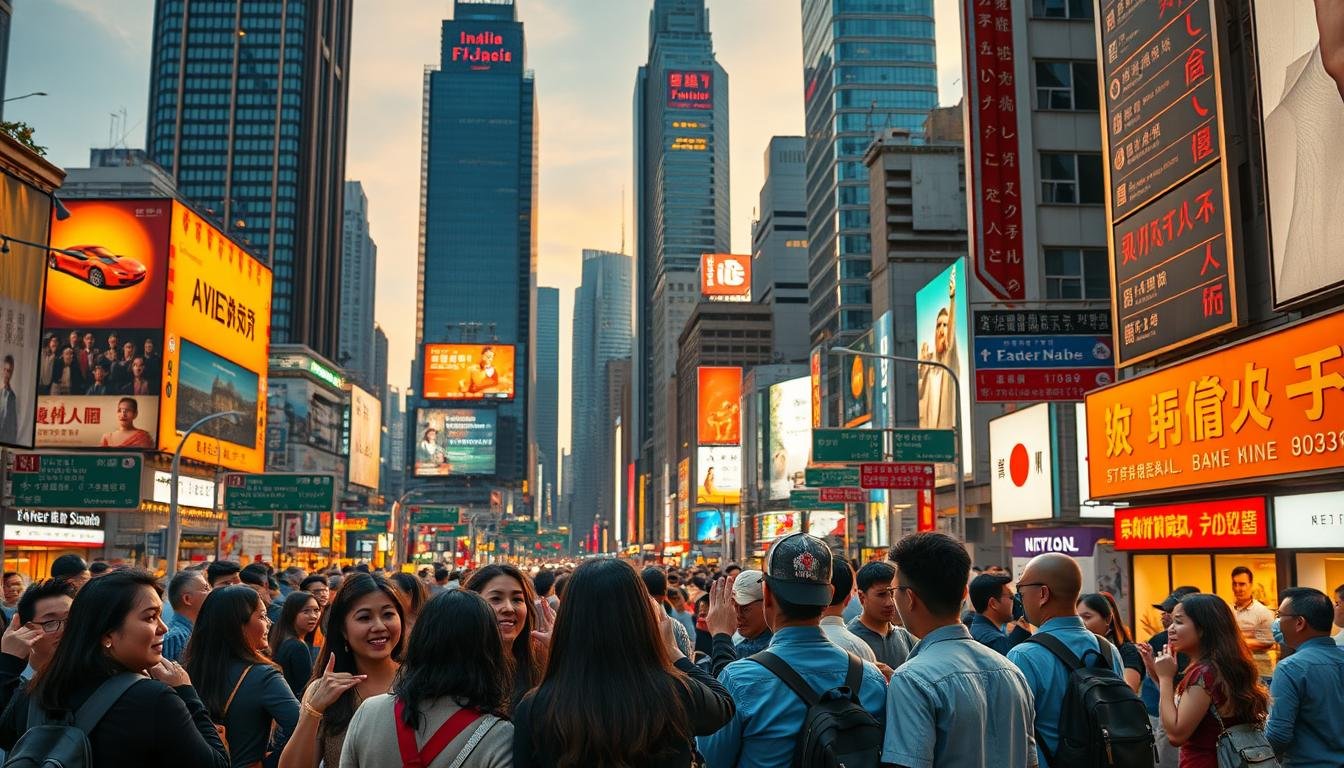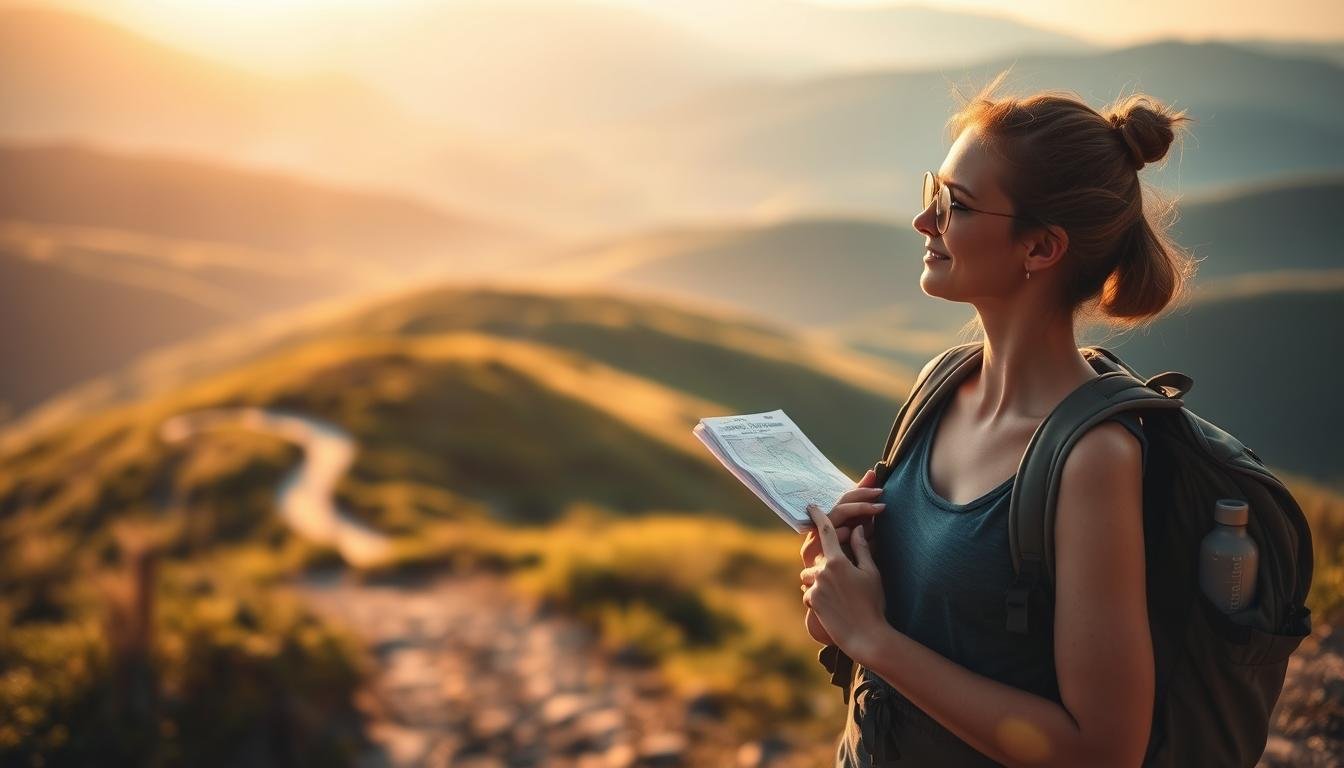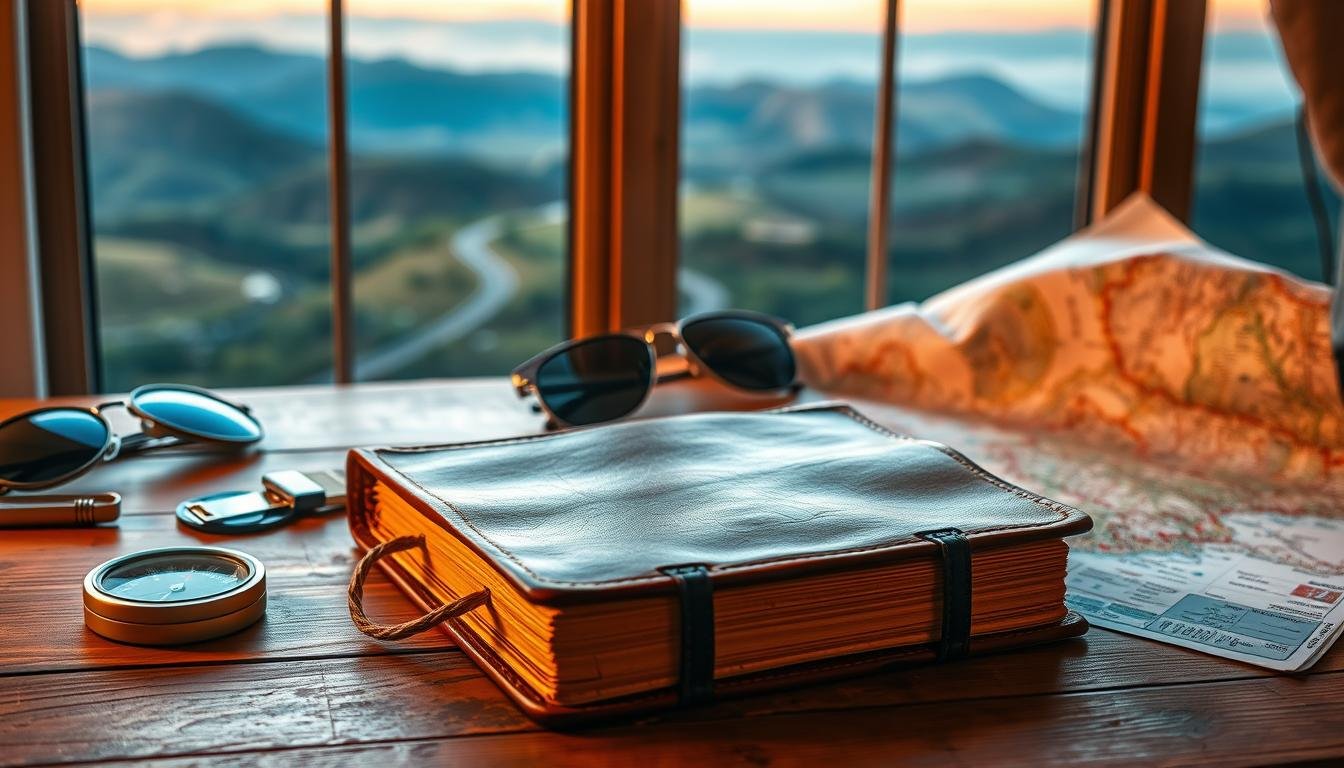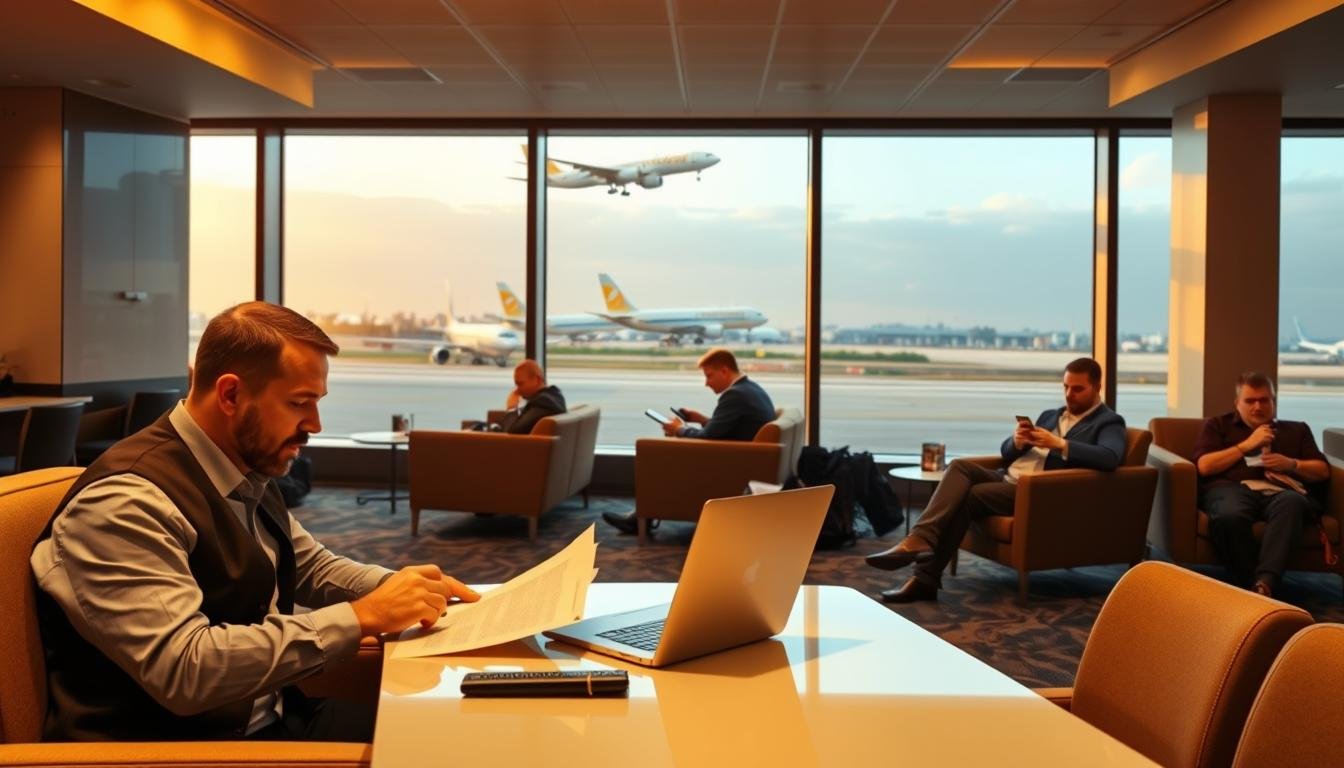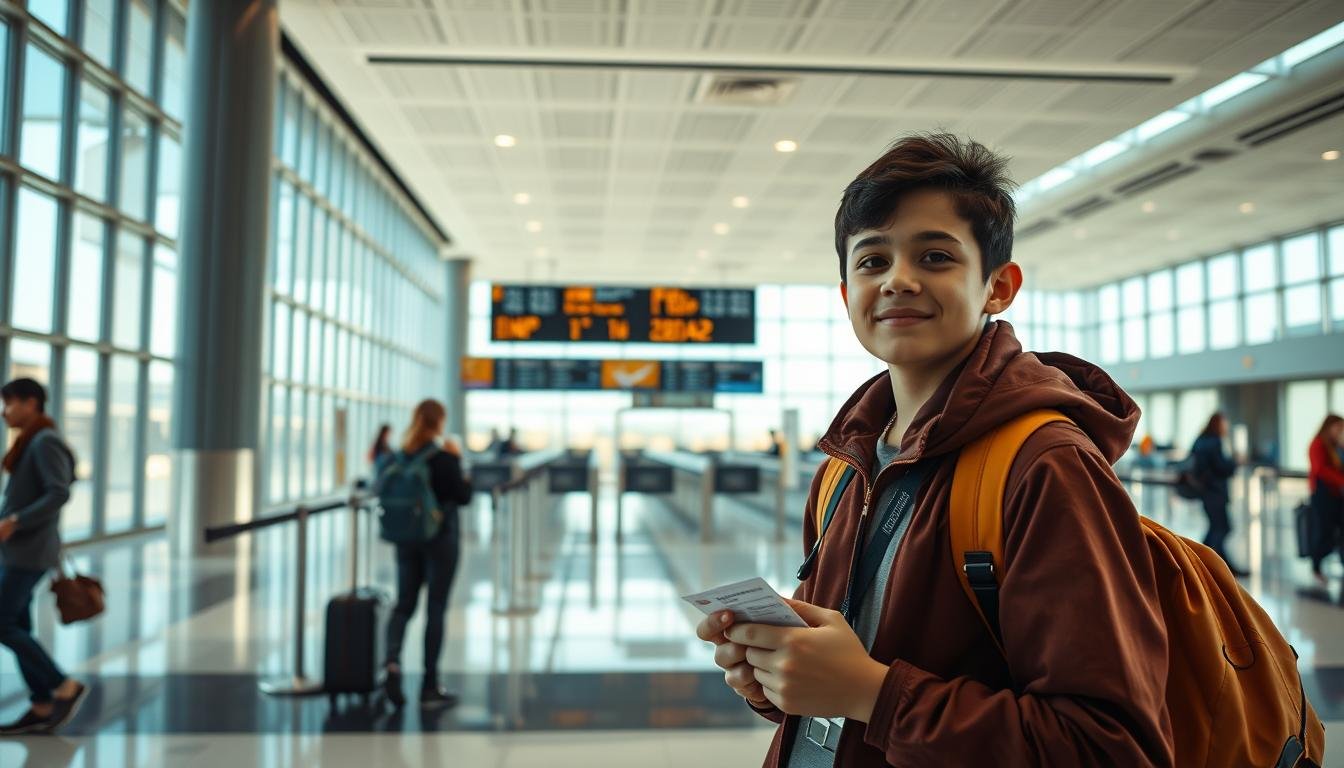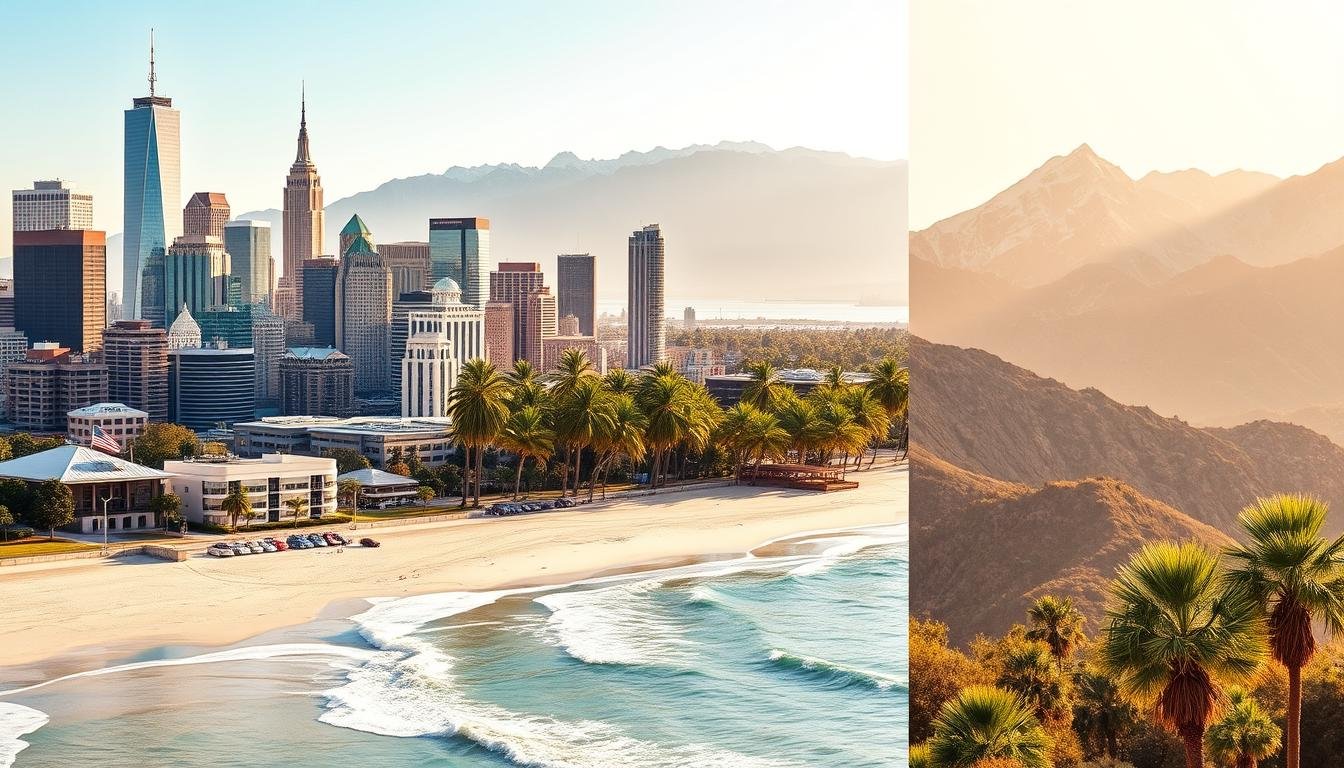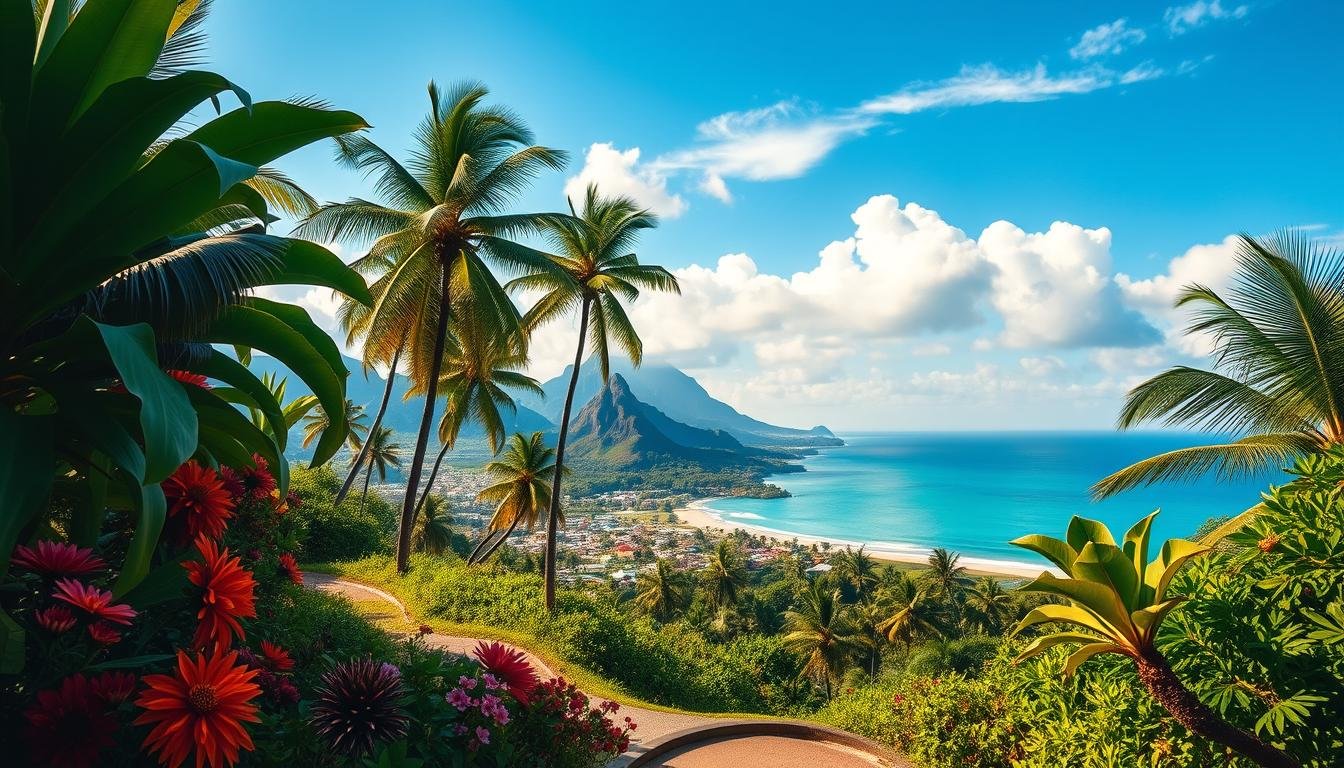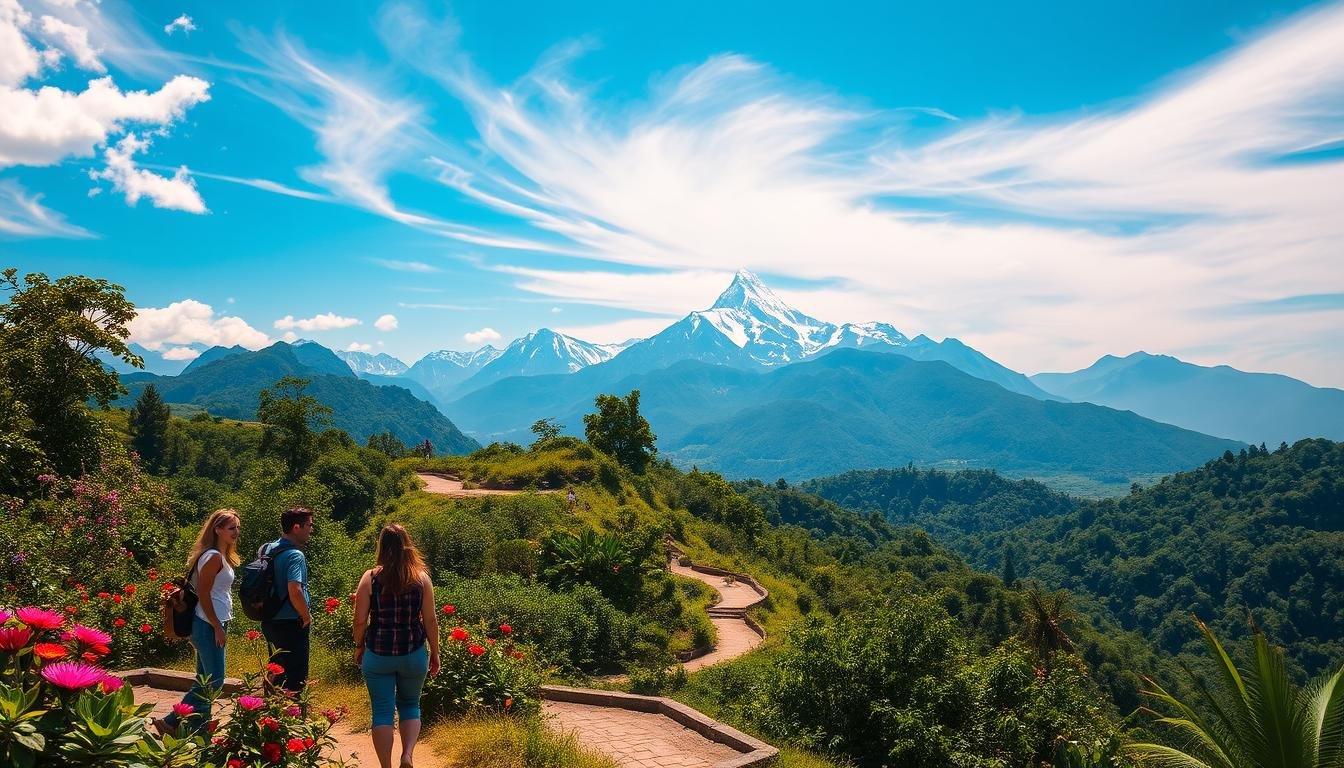Have you ever felt lost in a foreign country, trying to talk to locals? International travel is exciting, but it can be tough, mainly because of the language barrier.
Thinking back to my travels, I see how important international communication skills are. They make your trip better, safer, and more comfortable. Here, we’ll share some key language learning tips for smoother travels.
Key Takeaways
- Learn basic phrases in the local language to show respect and appreciation.
- Download language learning apps to aid in communication.
- Carry a phrasebook or a translation guide for emergencies.
- Be patient and open-minded when interacting with locals.
- Use body language and gestures to convey your message.
Why Language Skills Matter When Traveling
Language skills are key to a great travel experience. When we can talk to locals, we get a more real and fun trip.
Beyond Basic Communication
Knowing how to order food or find directions is important. But language skills do more than that. They help us understand the culture and customs of a place.
For example, learning a few words in the local language shows respect. It makes our interactions with locals better.
Building Meaningful Connections
Language skills help us connect with people we meet on the road. Talking in their language lets us share stories and learn about their lives. This makes our trip better and helps us understand their culture.
My Experience with Language Barriers
I once traveled to a country where I didn’t speak the language well. It was hard to get around and deal with emergencies. But learning a few key phrases made a big difference.
Locals were happy I tried to speak their language. It led to some amazing and unforgettable moments.
In short, language skills are essential for a good travel experience. They help us talk, connect, and understand the culture. Learning a new language before we go makes our trip better and more fun.
Preparing Your Language Skills Before Departure
To make the most of your travels, it’s key to prepare your language skills in advance. Good language preparation can make your trip better. It lets you move around foreign places with ease and connect with locals.
Setting Realistic Language Goals
First, set realistic language goals. Know your current level and what you can learn before your trip. Aim for things like basic phrases or vocabulary for your travel plans.
Focusing on Practical Vocabulary
Learning practical vocabulary is important. Learn common phrases like greetings and directions. This helps you deal with everyday situations.
Creating Custom Phrasebooks
A custom phrasebook is very useful. Make a list of essential phrases for your trip. Use it to quickly find what you need. Include translations, pronunciation guides, and examples.
My Pre-Trip Language Routine
I have a daily routine to keep up with language learning. I use apps, flashcards, and listen to native speakers. I also practice speaking with tutors to get better at pronunciation.
| Language Learning Activity | Frequency | Benefits |
|---|---|---|
| Language Learning Apps | Daily | Improves vocabulary and grammar |
| Flashcards | 3 times a week | Enhances memorization of key phrases |
| Language Exchange | 2 times a week | Improves pronunciation and speaking skills |
By following these steps and sticking to your goals, you’ll be ready to face language challenges on your travels.
Essential Travel Language Tips for Different Situations
Learning essential travel language tips can boost your confidence in new places. It’s not just about knowing basic phrases. It’s about being ready for any situation that comes up.
Transportation Terminology
Knowing transportation terms is key for smooth travel. Here are some important phrases to remember:
- How to ask for directions: “Where is the nearest train station?”
- How to book a ticket: “I’d like to book a one-way ticket to [destination].”
- How to ask about delays: “Is the flight delayed?”
Dining and Food Vocabulary
Eating out can be tough without the right words. Learning food-related phrases can make dining better:
- Ordering food: “I’ll have the [dish name], please.”
- Asking about ingredients: “Does this contain [allergen]?”
- Requesting the bill: “The check, please.”
Emergency and Health-Related Phrases
In emergencies, knowing the right words can save lives. Here are some key health phrases:
- Calling for help: “Help!” or “I need assistance.”
- Describing your condition: “I’m feeling [symptom].”
- Locating medical facilities: “Where is the nearest hospital?”
Shopping and Bargaining Expressions
Shopping is a big part of traveling. Knowing how to bargain and ask prices is helpful:
- Asking the price: “How much is this?”
- Bargaining: “Can you lower the price?”
- Confirming the purchase: “I’ll take this.”
Mastering these travel language tips can make your trip better. You’ll navigate cultural norms and language barriers with ease. This makes your journey more fun and stress-free.
Best Language Learning Apps and Resources for Travelers
In today’s digital age, language learning apps have changed how we prepare for travel. There are many options for travelers to find the right resources to communicate in foreign languages.
Free vs. Premium Language Apps
Choosing between free and premium language apps is key. Free apps offer basic lessons and are a good start. Premium apps, though, have more content, like interactive exercises and feedback.
Duolingo is famous for being free, teaching many languages. But, apps like Rosetta Stone need a subscription. They offer deeper learning experiences.
Offline Learning Tools
For travelers, learning offline is essential, as internet access can be scarce. Many apps now let you learn offline by downloading lessons.
Google Translate is a great example. It lets you download language packs for offline use. This is super useful in places with bad internet.
Audio Resources for Pronunciation Practice
Improving pronunciation is vital in language learning. Audio resources are very helpful. Many apps use audio clips for this purpose.
For example, iTranslate helps with pronunciation. It offers audio clips to teach the right way to say words and phrases.
My Top 3 Language Apps for Quick Learning
Based on my experience, here are three top language apps for quick learning:
- Duolingo: Known for its gamified approach to learning.
- Google Translate: Offers offline capabilities and a wide range of languages.
- iTranslate: Provides accurate translations and useful phrases for travelers.
| App Name | Key Features | Offline Capability |
|---|---|---|
| Duolingo | Gamified learning, various languages | Yes |
| Google Translate | Translations, phrasebook | Yes |
| iTranslate | Accurate translations, audio pronunciations | Yes |
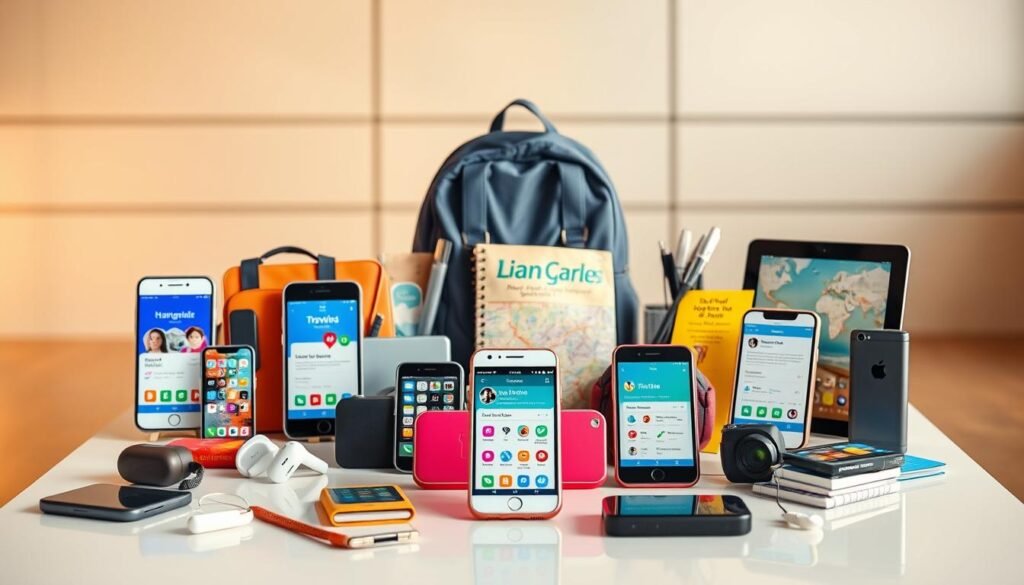
Overcoming Language Barriers While Traveling
Language barriers can be a big challenge when you travel. But, there are ways to get past them. Being creative and flexible in how you communicate is key.
Non-Verbal Communication Techniques
Using gestures and body language can help you get your point across. A simple hand gesture can show directions or needs.
Using Translation Technology Effectively
Translation apps are super helpful. They let you talk to locals, read signs, and even figure out menus.
When to Ask for Help
Don’t be shy to ask for help when you can’t communicate. Locals usually appreciate the effort to speak their language.
Creative Problem-Solving in Communication
Think creatively when you’re trying to communicate. Mix gestures, simple words, and technology to make your message clear.
Some tips for overcoming language barriers include being patient, using visual aids, and carrying a phrasebook. These strategies can improve your international communication skills and make your travels smoother.
- Be open to learning a few basic phrases in the local language.
- Use translation technology to facilitate communication.
- Don’t be afraid to ask for help or clarification.
Cultural Etiquette and Language Considerations
Traveling abroad means understanding cultural etiquette is key. Cultural norms and practices change from country to country. Knowing these differences helps us connect better with locals.
Respectful Greetings Across Cultures
Greetings are vital in any culture. In Japan, bowing is common, while in the West, shaking hands is usual. Knowing these can prevent misunderstandings.
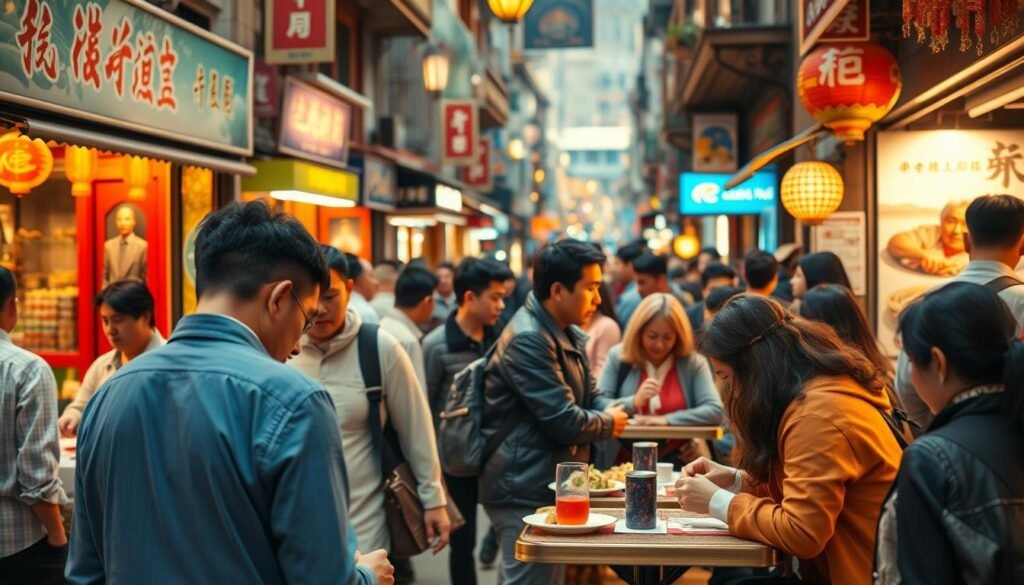
Understanding Cultural Context in Communication
Good communication is more than just speaking the language. It’s about knowing the cultural background. For example, direct eye contact means confidence in some cultures but aggression in others. Being aware of these subtleties improves our interactions.
Avoiding Common Cultural Misunderstandings
Actions or gestures can mean different things in different cultures. The thumbs-up sign is positive in the West but offensive elsewhere. Knowing these differences helps us avoid misunderstandings.
Regional Language Variations to Be Aware Of
Even within the same language, variations exist. For example, Spanish in Spain is different from Latin American Spanish. Understanding these variations shows respect for local cultures.
| Culture | Greeting Custom | Language Variation |
|---|---|---|
| Japanese | Bowing | Polite language (Keigo) |
| Spanish (Spain vs. Latin America) | Kissing on the cheek | Vocabulary and pronunciation differences |
| Indian | Namaste | Multiple languages and dialects |
Travelers can make deeper connections and have a richer experience by being mindful of cultural etiquette and language. This makes traveling abroad more rewarding.
Language Immersion Techniques for Travelers
Language immersion is a powerful tool for travelers. It lets you connect with locals on a deeper level. By being surrounded by the language, you can learn nuances and expressions not found in books or apps.
Staying with Local Families
Staying with a local family is a great way to immerse yourself in a language. You can practice the language naturally, from meals to asking for help. It also gives you a peek into cultural practices and traditions, making your trip richer.
Participating in Language Exchange Events
Language exchange events are another excellent way to dive into a language. They bring together locals and travelers to practice languages. You can have conversations, learn new expressions, and make friends. It’s a fun way to practice speaking and help others with your language.
Daily Practice Strategies While Abroad
Practicing daily is key to improving your language skills. Talk to locals, watch TV shows or movies with subtitles, and listen to local music or podcasts. Even simple actions like reading signs and menus can help you learn.
How I Improved My Spanish Through Immersion
During my travels to Spain, I focused on language immersion. I stayed with a local family, joined language exchange events, and practiced every day. Watching Spanish TV shows and listening to Spanish music helped a lot. This approach greatly improved my Spanish, letting me connect more with the culture and people.
Real-Life Stories: How Language Skills Transformed My Travel Experiences
Reflecting on my travels, I see how language skills changed everything. Knowing the local language improved my interactions and opened up authentic experiences. These are things I would have missed without it.
Unexpected Connections Through Language
Learning a new language lets you make meaningful connections with locals. In Japan, speaking basic Japanese with my host family deepened my understanding of their culture. Saying “arigatou” (thank you) correctly made our interactions more fun.
Navigating Challenges with Limited Vocabulary
There were times when my vocabulary was limited. I had to use non-verbal communication or apps to get by. In Morocco, a translation app helped me buy a handmade carpet at a fair price. These challenges taught me to be creative and resourceful in communication.
How Language Opened Doors to Authentic Experiences
Knowing the local language let me explore beyond tourist spots. In Italy, ordering food at a local trattoria helped me find a hidden gem. As Inspiring Travellers notes, language skills greatly enhance travel experiences.
Moments When Language Made All the Difference
| Language Skill | Experience |
|---|---|
| Basic phrases in Spanish | Connected with locals in Spain during festivals |
| Understanding French menu | Enjoyed authentic French cuisine in Paris |
| Conversing in Mandarin | Navigated through China with ease |
These stories show that language skills are more than just practical. They are key to experiencing travel’s true essence. By learning and using local languages, travelers can make lasting memories and connect deeply with others.
Conclusion: Embracing the Language Journey
Traveling internationally opens up new worlds and cultures. It’s a chance to make unforgettable memories. When you’re ready to explore, using language learning tips can make your trip better. Learning the local language turns every moment into an exciting adventure.
Traveling tips can help you find your way and connect with locals. Knowing the local customs shows respect and makes your trip more real. It’s all about immersing yourself in the culture.
Every time you speak, you learn something new. Stay open to new experiences and challenges. This way, your travels will be rich and meaningful, lasting long after you return home.
